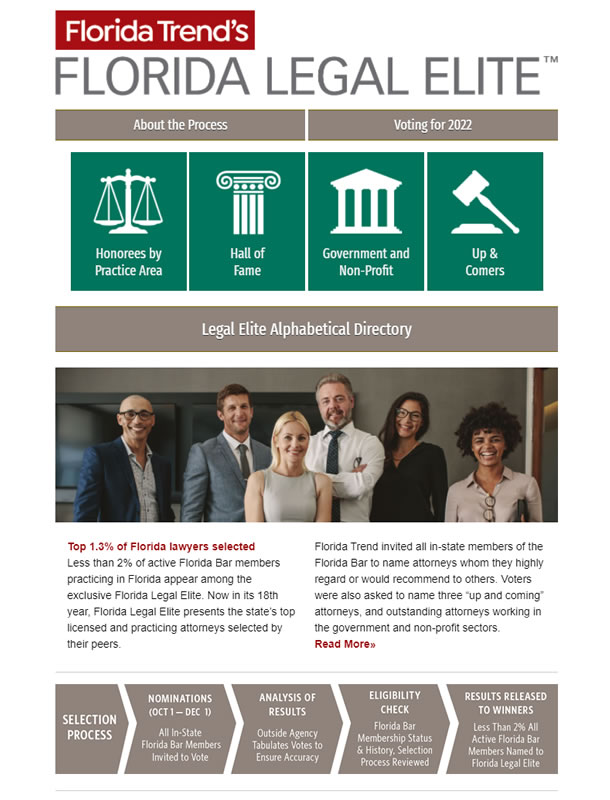SHARE:
Best Companies to Work For in Florida - 2023
Office Optional - The Evolving Workspace
The heads of Florida's Best Companies have mixed feelings about hybrid work arrangements, but most would agree the trend is here to stay.
Coastal Cloud, a Palm Coast technology consulting company with several major offices across the country, embraced remote work long before the COVID-19 pandemic came along. The business still does, says CEO Tim Hale, though an increasing number of staff are returning to the office — not because of a policy change but “because many people are re-discovering they enjoy the camaraderie and team learning of an office environment.”
That’s especially true for the company’s newest employees, including recent college graduates who joined the company post- COVID. Hale says they appreciate the collaboration and mentoring that comes with the office setting. “They realize they learn faster and have more fun and social connections working in an office than at home,” Hale says.
Coastal Cloud isn’t alone. McGinniss Himmel Insurance Agency in Tallahassee sent all but two employees home to work in March 2020, but by June everyone in the company chose to return to the office full time. As with Coastal Cloud, camaraderie and opportunities for “passive” learning and management were the big draws, says Allen McGinniss, the firm’s agency principal.
“Hearing those around you do their job and hearing your direct reports doing their job allows for people to learn as others are doing the work,” McGinniss explains. Managers also have an easier time with in-person mentoring, he says, as they’re able to recognize in “real time” when an employee needs additional attention or training. That said, he believes hybrid work arrangements — with a mixture of in-office and remote work — are here to stay, but he sees them as best “reserved for those folks who have learned enough to be self-sufficient and not be growing quickly in their role.”
National data also suggest a shift toward hybrid work models, as opposed to being fully remote.
A March 2023 survey by the Pew Research Center found that about one-third of workers with jobs that can be done remotely were exclusively working from home — a drop from 43% in January 2022 and 55% in October 2020. Of those working remotely, 41% do so on a hybrid schedule. The same survey found that 63% of hybrid workers are required to work a specific number of days per week or month in the office, with 59% working from home three or more days a week and 41% working from home two days or fewer. A study by Stanford economists (see “Key Remote Work Findings”) of U.S. residents had similar findings.
Most (97%) of Florida’s 2023 Best Companies allow telecommuting, with 44% of their employees, on average, working from home at least some of the time. Only nine companies report having 100% of their staff work from home, and many companies on the list have adopted hybrid arrangements.
Key Remote Work Findings
A monthly survey of workers by economists at Stanford University and other collaborators found that remote work accounted for 28% of “full” workdays (of six or more hours) during the first half of 2023. Amongst all workers, the study found:
59% Worked completely on-site
12% Were fully remote
29% Were in a hybrid arrangement
For employees able to telecommute, the most common work arrangements were:
34.9% Fully on-site
46.5% Hybrid
18.6% Fully at-home
Age Matters: Workers in their 50s and 60s were more likely to work fully at home or fully on-site than their younger counterparts.
| Age Group | Fully On-Site | Hybrid | Fully Remote |
| 20-29 | 58.8% | 32.0% | 9.2% |
| 30-39 | 52.6 | 36.5 | 10.8 |
| 40-49 | 58.3 | 30.4 | 11.4 |
| 50-64 | 68.8 | 16.1 | 15.1 |
Development Drawback:
In-office workers devote about 40 more minutes each week mentoring colleagues than do those who work remotely. All told, remote employees spend about a quarter less of their time in career-development activities.
Source: WFH Research and the Survey of Working Arrangements, a project run jointly by the University of Chicago, ITAM, MIT and Stanford University in collaboration with other team members on a UK and Global Survey of Working Arrangements
Larry Tobin, CEO of Orlando-based Fairwinds Credit Union, says the organization had few telecommuting options pre- COVID. In early 2021, the credit union implemented a “flexwork program” for employees with “non-member facing roles.” Depending on their position, time spent in the role and overall performance, employees may request to work from home (or at an alternate Fairwinds location) two days each week, or they can work a compressed schedule of four, 10-hour days.
He says the flexibility improves employees’ work-life balance and job satisfaction. It’s also had a positive impact on training and attracting top talent — particularly for support roles in IT, the credit union’s contact center, mortgage services, accounting, finance, digital lending, marketing and risk management.
One of the biggest challenges, according to Tobin, is keeping everyone connected and collaborating, particularly when they have different work-from-home schedules. “To combat this, we have implemented program guidelines such as requiring cameras enabled on all Zoom/Teams calls,” he says, and there’s a specific day each week when everyone must be on-site.
Each department also conducts daily huddles that employees attend either in person or on Zoom and monthly meetings are held in person. Managers also are encouraged to build and maintain relationships with their team members and hold regular one-on-ones as well as coaching sessions. “It’s important to always stay connected to one another,” he says.
Farm Credit of Central Florida in Lakeland also adopted a hybrid work schedule for staff after COVID restrictions were lifted that allows employees to work from home on either Mondays and Tuesdays, or Thursday and Fridays, which ensures everyone is together on Wednesdays. President and CEO Reggie Holt says the association has “blossomed” under the arrangement and it’s boosted the organization’s recruiting efforts.
Others still aren’t sold on the concept. Vince Mayfield, the CEO of co-founder of software development and managed IT services firm Bit-Wizards in Fort Walton Beach, believes there’s no substitute for face-to-face interaction.
Only 6.4% of the company’s employees work remote, Mayfield says, but it’s not his preference and the company generally doesn’t permit entry-level employees to work remotely. “We hire for in-office first,” he says. “If a potential wizard has a skillset we cannot fill with an in-office wizard, we consider the impact on the team and their work, but they must be a high-skilled, seasoned professional.”
A big challenge with telecommuting, according to Mayfield, is keeping remote employees engaged and feeling part of their team. There are logistical headaches too. It’s not easy, for instance, to get computers with multiple monitors or test devices for mobile development to remote team members while ensuring compliance measures are met. Remote workers also come with additional administration, software, technology and procedural costs.
“The only real pro for remote business work is the reduced physical office space and leasing costs,” Mayfield concludes. “The increased cost of logistics, productivity and team cohesion mars any cost savings.”
Impact on Office Space
Orlando developer Craig Ustler believes flexible work trends are reshaping the office space market. “The office building that we’re going to build in 2023 is a different looking office building than previous versions. It’s got touchless systems, it’s got great HVAC and filtration, it’s got outdoor areas, it’s got quality-of-life things that have to do with health and wellness and exercise and being green and sustainability — and just a lot of those kind of factors that folks are looking for. If you’re going to sell somebody on the advantages of being in an office environment, you have to make sure that environment is really responsive to what they want post-COVID,” Ustler says. Older “vintage” offices built in the 1970s and 1980s will become “functionally obsolete,” he predicts. “They’re just going to be at a further disadvantage.”



























